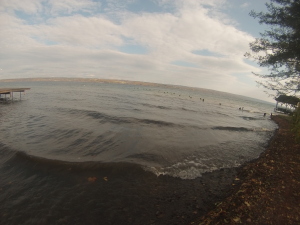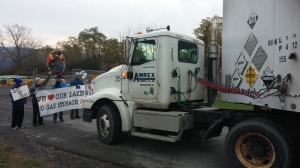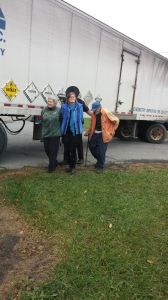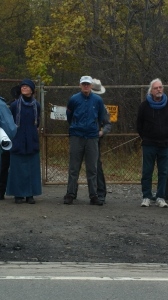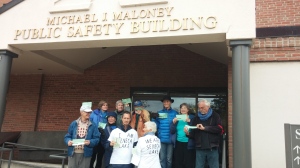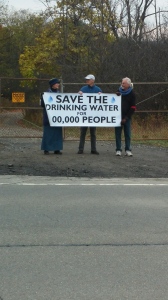When I was in Ohio and I called my dad to tell him I was coming home from the Climate March early, I was in a state of both sadness and disbelief. I couldn’t believe that Houston-based Crestwood Midstream had received federal approval to store methane in salt caverns along Seneca Lake, my home, and I did not want to leave my March family. He assured me I was doing the right thing.
“You’ll still be fighting the same fight.”
Seneca Lake
I know he’s right, but it’s hard to believe that it is the same fight. The type of work and the mood of the situation here at home is entirely different from the Climate March. The March is addressing the broader issue of climate change, which encompasses gas storage on Seneca Lake along with hundreds of other projects around the country and the world. Our primary activity is walking and experiencing our world and the stories of the people living in it. It is our responsibility to bring the concerns, questions, hopes, dreams and prayers of the American citizenry to President Obama’s doorstep. We live in community, and we are constantly surrounded by love and friendship.
Back here in Upstate New York, the story is much different. Although I am making many new friends (none of them my age) and finding a place in a new community of inspiring people, the tone is more focused and serious. While the Climate March is mostly an awareness-raising, mind-awakening crusade across the country, the fight to save Seneca Lake is exactly that; a fight. A battle. We are waging a weaponless war.
There are strategics and long planning meetings, reconnaissance missions and hours of research, media swarms and endless floods of emails, and the planning committee even fondly calls the citizens who have joined the resistance “troops.” And yet, we are fighting this war in peace, because we know that using violence to bring about peace is one of the biggest paradoxical mistakes humanity is still consistently making.
The Finger Lakes community has not arrived at the decision to use civil disobedience lightly. We have used every other possible option to redress our grievances. We have contacted and met with our representatives, we have written countless letters to the editor, we have rallied, we have united the area’s businesses against the project and we are pursuing the matter in the courts. Yet, the Federal Energy Regulatory Commission blew past the overwhelming local opposition to the gas storage project and gave Crestwood the green light to store methane gas in unstable salt caverns beneath the western shore of Seneca Lake. Although FERC’s decision is certainly angering, it doesn’t necessarily come as a surprise. FERC is a federal agency that receives most of its funding from approving permits; hence, the more permits they approve the more money they get. This is a perfect example of our government valuing money over people and the planet.
The only thing we have left is our bodies. Although Crestwood claims in its biweekly reports to FERC that it has not yet started construction on the compressor station for the methane gas, they have been authorized since October 24th to begin. On October 23, 24 and 28, we blockaded the main entrance to Crestwood for most of the work day. Each day, they locked the gates and left us alone. On October 29, we knew we had to step up our game. Our group split up, and we blockaded both the main entrance and a smaller southern entrance at the same time. At first they shut both gates and made it look as though they were going to let us sit there again, but not long after a manager appeared asking if we would let a truck in.
“Tell me, how do you define ‘blockade’?” Lindsay Speer, my fellow Seneca Lake Defender asked.
Our resolve and commitment to nonviolence would soon be tested.
At the main gate, I was playing the role of police liaison, peace keeper and videographer/photographer. The group at the south gate called to tell me they had just turned away the manager, and to expect him at my gate next. About ten minutes later, a freight truck from Amrex Chemical Company based in Binghamton pulled into the driveway, and the manager appeared at the gate and asked us to let the truck in. I clarified to him that our blockade was not going to let anything in or out.
“Well, I’m going to open the gates, then!” He declared in a tone that said, ‘alright, you asked for it.’ The negotiation phase was over; now, they were using intimidation.
When he opened the gates, the driver climbed into his truck and lurched forward, blaring his horn. The members of the blockade looked on fearlessly and didn’t so much as flinch. The truck came to a rest just feet away from where they were standing, but the driver proceeded to rev the engine. I had never been so proud.
“The state troopers will remove you!” The driver declared, dutifully snapping open his flip phone.
From left to right: Colleen Boland, Sandra Steingraber and Rolan Micklem being taken into custody
The local and state police arrived, and without giving a lawful order to disperse they immediately took the seven blockade members at the main gate, including fracktivist and biologist Sandra Steingraber, into custody. After the main gate was cleared, they went to the second gate and arrested the three people blockading there.
From left to right: Nancy Kasper, Chuck Geisler and Dwain Wilder
Somehow, the arrestees at the main gate managed to incur both a trespass violation and a charge of disorderly conduct. A trespass charge is granted when a person is on private property. A disorderly conduct charge is granted when a person is disruptive on public property. This means that the seven of them were miraculously on private and public property at the same time. We expect this issue to be addressed at their court date in the Town of Reading outside Watkins Glen this upcoming Wednesday.
These are the faces of the first 10 people to be arrested in the We Are Seneca Lake resistance movement. They include mother and son team Jeanne and Astro Judson, 86-year-old environmentalist Roland Micklem, retired Air Force Master Sergent Colleen Boland and others. They will not be the last. I personally expect to be behind bars myself before the year is out.
When the government and elected leaders fail to serve and protect the people, breaking the law becomes a public service. Standing nose to nose with a freight truck becomes an act of bravery, not an act of foolery. When the people are ignored in a democratic system, we cannot sit back complacently and allow power-abusers to walk all over us.
We must rise.


